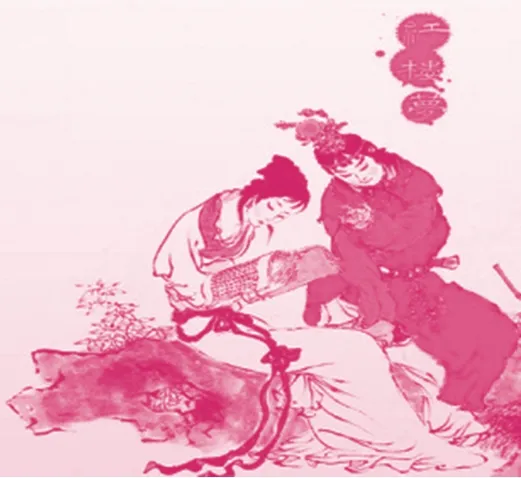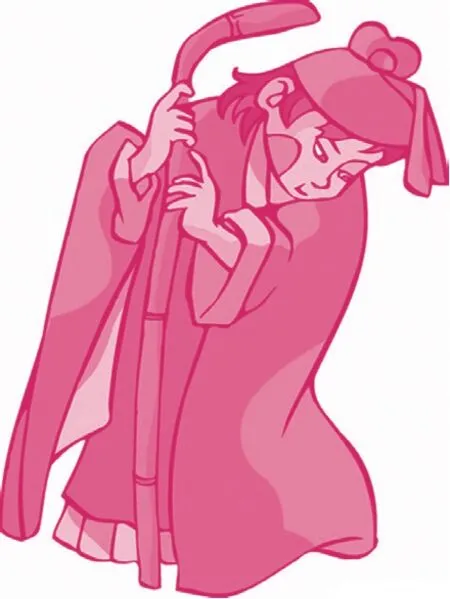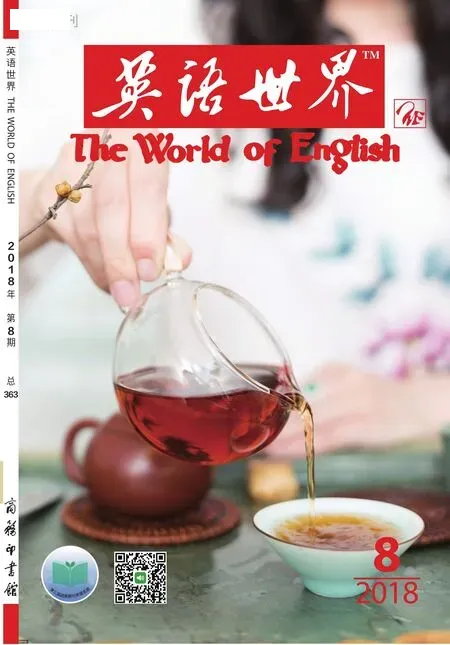“闲人”难寻
文/任东升 译/曲磊
In the closing pages ofA Dream of Red Mansions, the Reverend Void brought the scripts of theStory of the Stoneto“the land of prosperity” to seek “a man of leisure” to read and pass on the story.However, what he could only fi nd were busy and occupied men: “there are only men striving to go after fame and wealth or feed and clothe themselves,” and there was no way to fi nd such a man as he wished. Finally, he came across Cao Xueqin, the owner of the “Mourningthe-Red Studio” who was a real “man of leisure” in “kalpas and aeons.”
[2] Well, Mr. Cao was not among those who had “nothing to do” or had“time to spare.” Actually, he was reading and commenting historical records.As Gu Hongming (1这里的“建功立业之人”实际上与后面的“糊口谋衣之辈”形成对比,与下文也有呼应,并不是特指真正建大功立大业之人,而是指一种生活状态,与“仓禀实而知礼节”有异曲同工之妙,所以灵活处理为go after fame and wealth,也符合英文常见的表达习惯。857—1928) put it,“leisure” literally means “free or comfortable.” Rather than sayA Dream of Red Mansionsimplies in its closing pages that “men of leisure” like Cao
《红楼梦》末尾讲到,空空道人携带《石头记》抄本来至人间“那繁华昌盛的地方”,欲寻一位“闲人”来阅裁这桩故事。道人却见世人忙碌的景象:“不是建功立业之人1这里的“建功立业之人”实际上与后面的“糊口谋衣之辈”形成对比,与下文也有呼应,并不是特指真正建大功立大业之人,而是指一种生活状态,与“仓禀实而知礼节”有异曲同工之妙,所以灵活处理为go after fame and wealth,也符合英文常见的表达习惯。,即系糊口谋衣之辈”,哪有此等“闲人”!最终,空空道人又不得不经历“几世几劫”,才找到“悼红轩”的主人曹雪芹这个“闲人”。
[2]其实,曹雪芹并不是“没事做”或者有“闲空儿”,他在“翻阅历来的古史”。辜鸿鸣理解的“闲”,字面意思是“自在或者悠闲”。《红楼梦》末尾暗示,像曹雪芹这样的“闲人”难觅,倒像是提醒“各位看官”照照自己:是否为“建功立业”或者“糊口谋衣”所累?活得是否还算“自在”“悠闲”?Xueqin rarely exist, why not consider it this way: we should ask ourselves whether we are enslaved by “going after fame and wealth” or by “feeding and clothing ourselves,” or, whether we really enjoy a “free and comfortable” life in some way.
[3] In such a big and populous world,there are indeed three kinds of men as the Reverend Void observed: the first are “those struggling to feed and clothe themselves” and busy with making ends meet at the bottom of society; the second are the middle class who are “going after fame and wealth” with some career achievements and not plagued by breadand-butter issues; the third are “men of leisure” who will not be bothered by sophisticated connections among people and mundane affairs, possess a “mood of leisure,” enjoy “leisure and comfort”to some extent, and even behave in a manner of “leisure and elegance” more or less. However, not all at the very top of society are such people.
[4] Some 30 years ago, workers,farmers and soldiers could be identified by the color of what they wore.Back then, you couldn’t fi nd real “men

[3]滚滚红尘,芸芸众生,确如空空道人的观察,不外乎这三等人。第一种“糊口谋衣之辈”,指为生存而奔波2“为生存而奔波”实际上是对社会底层劳苦大众生活状态的一种概括性描述,而英文中正好有常见的对应表达,即make ends meet,这种译法也有助于英文受众去理解原文作者的表达本意。的人们,处于社会的最下层;第二种“建功立业之人”,基本摆脱了生计之忧、有自己的事业可言,属于社会的中等阶层;第三种是“闲人”,应该是不屑于3对“不屑于”的理解应该深入到文字背后所隐含的意思,如果字对字的去译成scorn抑或是despise,则显得过于刻板,“闲人”不会简单地去轻视“人情世故”,只是看透了世事,不受其扰而已,所以这里处理为will not be bothered by则完整地表达了作者的原意。世间人情或俗务,胸有“闲情”之人,他可以“闲适”到一定的程度,或者多少有些“闲逸”之风。生活在社会上层的人士,却不全是这等人。
[4] 30多年前,只看衣服的颜色,就能区别出工、农、兵。那时候,全国上下没有闲人。“人多力量大”“多快好of leisure” across the country. People were mobilized by such enthusiastic slogans as “many hands make light work,” “achieve greater, faster, better and more economical results” and “race to the top,” and you name it. Overall national programs, planned economy and reliance on the local Party organizations put everyone in position and set everything in order. It was understood that it was different jobs and division of labor that resulted in different salaries and bene fi ts. As a student, you needn’t to be anxious about your school performance as there was no competition around you; as a worker, your fellow workers were as much exhausted as you were at work; although you might live in a small home with a big family, you needn’t to squeeze yourself into buying a property at least; you were poor,but your neighbors were no richer than you; when you got sick, you would not be worn out by astronomical medical cost as your employer and government省”“争上游”等观念如同口号一样支配4本段讲述的是具有中国特色的特殊年代里的特殊现象,若在译文中能出现体现时代特色的词汇会更具感染力,所以这里的“支配”译成mobilize,即“动员”的意思,也与前面的各种口号相对应。着每个人。国家统筹,计划经济,信靠组织,各尽其职。虽然在待遇5“待遇”实际上是中文里典型的概括性描述,在翻译此类词汇时最好加以解释,使得英文受众明白其包含的具体意思,所以解释性译成salaries and bene fi ts,即工资和福利。上有所不同,每个人都能理解那是因为职业不同、分工不同。你上学不操心成绩,同学对你也不构成竞争;你做工累,看看工友也喊累;家口多,住房小6“家口多,住房小”,在英语世界中也是常见的现象,那么必然存在常见的英文表达,在翻译此类句子时,最好的策略就是套用一些常见的英文表达,而不是拘泥于字对字的“死译”,所以译成了livein a small home with a big family。,你用不着为房产犯愁;你家穷,邻居家也不比你家富;等你得病了,药费、医疗费再贵,也有组织和政府7“组织和政府“是具有中国特色的表达,翻译前要具体情况具体分析,看看原文作者是在表达什么意思,显然“组织”和“政府”这里指代的是“集体”,这种理解也与前文的“国家统筹”和“计划经济”遥相呼应,所以译成了employers and government,这也符合常识。替你掏。那时,would reimburse you. People would not be laughed at for not wearing decently,or be humiliated for the lack of money,or even lose dignity for not taking dignity seriously. Why? It was because all members of the society were entitled to equal rights, though individuality was not encouraged and individualism was constrained.

[5] Nowadays, “those struggling to feed and clothe themselves” are still making ends meet by pursuing physical labor. Migrant workers, employees, stallholders, and even the low- and middleincome working class are among the rest. They are stuck in repetitious physical toil or no-brainer jobs by the grueling burden of child education old-age insurance and home loans. Farmers and migrant workers have lost their original identities after giving away their own land and leaving their families, but still cannot be accepted in a new labor environment. Small beds, makeshift shacks,boring labor and stereotyped work are all they have. The employed have to survive a career with rare opportunities to get promoted, the harsh punch-theclock system, and reproach from their supervisors. When they fi nally get back home after a day’s work feeling exhausted, they still have to be af fl icted by rents and home loans. They work hard days after days and years after years. As Job says in the Book of Job of the Old你没有因为穿得寒酸而遭人鄙视,也不会因为钱少而被人嫌弃,更不会因为生活中不讲究尊严而失去尊严。究其原因,是社会成员之间存在基本的平等,尽管个体不被凸现、个性被迫收敛。

[5]如今的时代里,“糊口谋衣之辈”依然是主要靠出卖体力换取生计之需的劳动者。农民工、打工仔、小摊主,甚至收入不高的工薪阶层,都属这个阶层。为了孩子上学,为了养老保险,为了房子贷款,不得不从事重复性的手工的或机械的劳动。农民离开了自己的土地,打工仔别亲离乡,失去了原有的身份,在新的劳动环境中也无法构建自己的身份。拥挤的床铺,简易的工棚,没有新意的劳作,缺乏创意的工作。工薪族被卷入晋升渺茫的职业,钟点的严卡,督工的声音,回家时疲惫的脚步,没有家居感觉的租赁房或贷款房。辛勤的劳作日复一日,岁岁年年。正如《旧约·约伯Testament, “living is like being forced into the army.”
[6] For teachers, government of fi cials,managers and business owners, work
stress has overshadowed personal fulfillment and happiness at work,though they work without exposing themselves to the weather, and have enviable welfare, secure monthly salaries,and a superior sense of belonging and high social status. It is true that they have to endure peer competition, pressure from job performance, and rare promotion opportunities, but they could still see the silver lining and “go after fame and wealth” as long as they excel in what they do, stay optimistic and have good people connections. With higher academic or professional qualifications, they work harder and dare not记》中约伯(Job)的感慨,人生在世如同被迫当兵8这里涉及“回译”。作者化用了圣经内容,《约伯记》第7章第1节,英文“钦定本”是“Is there not an appointed time to man upon earth? Are not his day like the days of an hireling? ”,意思是:人在地上没有定期吗?他的日子不像雇工的日子吗?现代中文圣经译本里的译文是:人在世上,好像被迫当兵一般,天天过着负重劳苦的生活。(英文和中文表述不一样的根本原因是各自参照的圣经“原文”有差别。)因此在翻译时有必要查考圣经英文版本和中文版本里的相关译法,然后再决定照抄现成译文还是自行翻译。这里,译者是自行翻译,对圣经内容无不敬重之意,也不影响全文的精神。。
[6]教师、公务员、管理者,还有自己开公司的人,工作的压力超出了职业本身带来的满足和快乐。摆脱了日晒风寒之苦,享受着不少9“不少”是修饰福利的程度,但在翻译时我们可换位思考,从另外一个角度进行英文表达,译成enviable,即“令人羡慕的”福利有时候也不失为一种选择。福利,有稳定的月薪,享受优越的归属感和社会地位。尽管同事间存在竞争,业绩指标添压力,升迁机会不易得,但是只要精于业务,积极向上,人脉畅通,“建功立业”的前景并不渺茫10“前景并不渺茫”这里内含希望之意,而英文中常见的类似表达the silver lining (a hopeful and comforting prospect in the midst of dif fi culty)正好贴合此处,可以套用过来。。学位和职称高了,为保住头上的光环,更加兢兢业业,更加不敢苟闲。是谁逼着你脚步加快吗?不是的。政绩多了,官位高了,indulge themselves in “leisure” in order to live up to the fame and reputation they have earned. Are they compelled to do so? No. More achievements and higher official positions only compel them to reach a greater status. Does it have anything to do with their supervisors? No, it doesn’t. Higher income and better living conditions induce them to think hard on how to earn more.Do their families have any complaints about their incomes? Absolutely not.They still don’t think they are “men of leisure” though they have succeeded in“going after fame and wealth” through hard work. It seems that everyone tries to prove something, but what do they really try to prove?
[7] For us, “good times” do not lie in innocent childhood or in carefree days after retirement. In our busy lives, each and every one of us does not feel “free”or “comfortable.”
[8] It dawns on me that Mr. Wang Meng said earlier this year: “Never and ever say you are a man of leisure.Otherwise, God will take care of you himself for he cannot tolerate to see you have nothing to do or have nothing to be concerned about.” So, I really doubt there are real “men of leisure” in our era. ■对位置的追求更高。是上司在强迫吗?不是的。收入多了,条件好了,还要苦思冥想赚大钱的门道。是家人嫌你挣钱少吗?不是的。拼搏进取,完成了“建功立业”。之后,却还是没有收获“闲人”的感觉。似乎每个人都想证明什么。究竟想证明什么呢?

[7]人活着,“好光景”不在于未谙世事的少年时代,更不在退休以后的闲散时日。在茫茫碌碌中,每个人都觉得不“自在”,不“悠闲”。
[8]记起王蒙今年说过的话11这里“记起王蒙今年说过的话”的意思比较耐人寻味,有受其启发之意,故没有直译,而是选择了英文常见的表达dawn on来承接原文意思,符合英文受众的表达习惯。:千万不要说你是闲人。否则,老天爷见你无事可做,啥事也不操心,就快收你了。连王蒙都这么想,我真的以为,在我们这个时代,“闲人”难寻了。 □
- 英语世界的其它文章
- How the Tea Ceremony Works
- Major Lawrence—for Steve Ormrod
- Translation platforms Cannot Replace Humans
- A View from China on the Future of Innovation and Education
- Do Aliens Exist? Human Technology May Prevent Us from Finding Out
- Home Is Where the Art Is: The Unlikely Story of Folk Artist Maud Lewis

